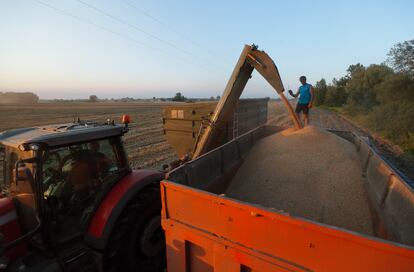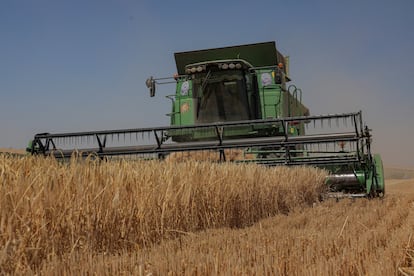The fear of Ukrainian farmers: ‘If there’s no grain agreement, we’ll close in two years’
Russia’s exit from the Black Sea Grain Initiative puts the Ukrainian agricultural sector on the ropes. The crops are piling up in the silos that Moscow bombs, while the price of transporting goods by land has multiplied


Grzegorz Kobeluch, 53, is a hard-faced man of few words. Polish with Ukrainian roots, he’s one of the owners of West Agro — a Ukrainian agricultural company.
Maybe because of his heritage — or maybe because it was simply a good business opportunity — he crossed the border to work the 25,000 acres of wheat fields, distributed among a handful of towns on the western fringe of Ukraine.
West Agro exemplifies the damage that Moscow’s blockade of the Black Sea has done to Ukrainian agriculture. In the past, the grain would be shipped out through the Port of Odessa, in the southwest of the country, but now this route can’t be used. Instead, the grain has to be transported by train to Western Europe, but the narrow rail infrastructure complicates everything. On top of that, while Poland allows Ukrainian grain to pass through its territory, the government — to protect local farmers — has imposed a ban on the purchasing of the produce, meaning that it has to travel a much greater distance to reach buyers.
Kobeluch — who doesn’t seem like a pessimistic fellow — affirms: “If things continue like this, we’ll have funds for one year, but not for two, we would have to close.” His company employs 80 people.
In the middle of July, Russia announced that it wouldn’t extend the grain agreement reached a year ago with the mediation of Turkey and the U.N., which cleared the journey of cargo ships through the Black Sea. If the situation for Ukraine’s agricultural sector — the main source of its exports, with less than a third of the harvest allocated for domestic consumption — was already complicated, now, it’s suffering from a barrage of daily torpedoes, both literally and figuratively. The Russian veto has also put economies in the Global South at risk, as many nations depend on wheat imports. The European Union and the U.N. have warned of a possible food crisis.
The UCAB agrarian association — which brings together the largest Ukrainian companies in this sector — shares an important piece of data with EL PAÍS: two million tons of cereals destined for export haven’t been able to set sail in the last year. “The inability to export through seaports,” says Svitlana Litvin, an analyst at UCAB, “the destruction of infrastructure in Odessa and the Danube river ports, and the ban on importing agro-industrial products in neighboring EU countries will have a very negative impact.”
On the ground, one can see that the corn stalks in the West Agro fields are very tall, with rich, bright green leaves showing. They’re ready for harvesting. Your eyes get lost trying to see the end of the cultivated land — in Ukraine, the fields are endless. Ninety percent of what Kobeluch’s men have planted is corn, while 10% is wheat. In charge of operations is Nazarii Garasim, a 28-year-old Ukrainian. Elegant, tall and smiling (despite everything), he recounts another problem: “We have to keep the corn where the wheat that we haven’t sold is stored.” That is, in the storage elevators, which are the most important place in an agricultural company, and the target of Russian missiles. These silos — like those attacked by Moscow in the Port of Izmail last week — can hold up to 85,000 tons. From there, the wheat is loaded onto the trucks and sent to the western border. But if the grain doesn’t sell quickly enough, there’s no room for the new crops, which are either harvested late, or they rot.
The agreement between Ukraine and Russia — brokered by Turkey in July 2022 — allowed cargo ships carrying grain to leave the Odesa terminals, following inspections by Ukrainian, Turkish, Russian and U.N. officials. This laborious process was very slow at times — according to UCAB data, this past July, only 292,000 tons were exported through this channel. Each time the pact was set to be renewed, Moscow showed hesitation, claiming that the contents of the agreement weren’t being complied with, or demanding that the sanctions be lifted. And then, 20 days ago, Russia left the table completely.

This past Friday, the spokeswoman for the Russian Foreign Ministry — Maria Zakharova — listed Moscow’s demands, with a tone of annoyance at Washington’s pressure to return to the grain agreement. On behalf of the Kremlin, she denounced obstacles to exporting its own grains and fertilizers, two essential products for many countries in the Global South. Zakharova conditioned the return to the talks with the reconnection of the Russian agricultural bank — Rosselkhozbank — to the international payment system SWIFT. The disconnection of Russian banks from this platform was one of the first sanctions agreed to by the West after the start of the invasion in February 2022. She also demanded the reestablishment of transportation logistics and insurance coverage for the Russian agricultural sector, while emphasizing that Russian companies must be allowed to access their assets abroad.
Maksim Panchenko is an analyst for the online publication UkraineWorld, run by Ukrainian journalist and philosopher Volodymyr Yermolenko. Panchenko believes that yielding to the demands expressed by Zakharova would give a “double victory” to Moscow. First, on the “strategic” level, “it would mean that Russia is no longer stuck in a dead end in the face of anti-Russian Western unity.” And secondly, in a “reputational” sense: “The Kremlin’s goal is to cancel Putin’s image as a big Hitler-style villain. Russia will try to say: if we were really like Nazi Germany, would the world be negotiating with us?”
The UkraineWorld analyst also warns that the consequences of the breach of the agreement will not only inflict a new blow on the Ukrainian economy, “but [this will also have an effect] on buyers who were waiting for their grain and will not receive [their orders].”
Despite everything, the businessman Kobeluch — who estimates that he has lost millions of hryvnas due to the resumption of the blockade in the Black Sea — is optimistic. “I think they [Ukraine and Russia] will come to an agreement,” he shrugs. They have no other choice.
However, as the negotiations drag on, agricultural businesses are suffering. In fact, the costs they’re facing have already increased. West Agro is, again, a good example of this. Kobeluch calculates that they spend €90 ($98.8)for each ton of grain that they take by rail to the Netherlands, one of the main destinations for their cargo. Exporting through the Port of Odesa, on the other hand, cost them only €35 ($38.4) per ton.
“And if you can’t sell all that you’ve harvested?”
“We have to sell it no matter what,” Kobeluch answers grimly.
In a way, he still projects the confidence of a businessman who will always figure out how to achieve his goals. He already did it when, one day, he saw that a lot of grains were being left over during the harvesting process. He decided to embark into the world of livestock, so that this wouldn’t go to waste. Around 500 cows are now benefiting from this new little venture.
“Sooner or later, the war will end. But that doesn’t mean we should sit around doing nothing in the meantime.”
Sign up for our weekly newsletter to get more English-language news coverage from EL PAÍS USA Edition
Tu suscripción se está usando en otro dispositivo
¿Quieres añadir otro usuario a tu suscripción?
Si continúas leyendo en este dispositivo, no se podrá leer en el otro.
FlechaTu suscripción se está usando en otro dispositivo y solo puedes acceder a EL PAÍS desde un dispositivo a la vez.
Si quieres compartir tu cuenta, cambia tu suscripción a la modalidad Premium, así podrás añadir otro usuario. Cada uno accederá con su propia cuenta de email, lo que os permitirá personalizar vuestra experiencia en EL PAÍS.
¿Tienes una suscripción de empresa? Accede aquí para contratar más cuentas.
En el caso de no saber quién está usando tu cuenta, te recomendamos cambiar tu contraseña aquí.
Si decides continuar compartiendo tu cuenta, este mensaje se mostrará en tu dispositivo y en el de la otra persona que está usando tu cuenta de forma indefinida, afectando a tu experiencia de lectura. Puedes consultar aquí los términos y condiciones de la suscripción digital.








































